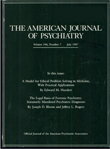Twin concordance for attention deficit hyperactivity disorder: a comparison of teachers' and mothers' reports
Abstract
OBJECTIVE: The present study examined probandwise concordance rates for attention deficit hyperactivity disorder (ADHD) in a community sample of 194 monozygotic and 94 dizygotic male twins, ages 11-12 years. METHOD: DSM-III and DSM-III-R diagnoses of ADHD were based on rating scale reports from the twins' teachers and structured interview reports obtained from their mothers. Model-fitting analyses were used to estimate genetic and environmental effects on ADHD. RESULTS: Concordance rates for ADHD were greater for monozygotic than dizygotic twins according to both mothers' and teachers' reports; this finding indicates the importance of genetic factors in the etiology of this syndrome. Fifteen percent of subjects received an ADHD diagnosis by teachers' ratings, compared with 6% by mothers' reports. Three percent of subjects met criteria for ADHD in both school and home settings. Teachers' ratings yielded moderate monozygotic and dizygotic concordance rates, in contrast to mothers' reports, which indicated a high monozygotic and a zero dizygotic concordance for ADHD. A model that included additive genetic and nonshared environmental factors provided the best fit to these ADHD data. CONCLUSIONS: ADHD, as defined by DSM criteria, appears to be a genetically influenced disorder whether diagnoses are based on teachers' or mothers' reports. However, the extent of this genetic influence seems to vary by informant source. These findings suggest that obtaining diagnostic data from either teachers' or mothers' reports alone may provide an incomplete characterization of ADHD.



